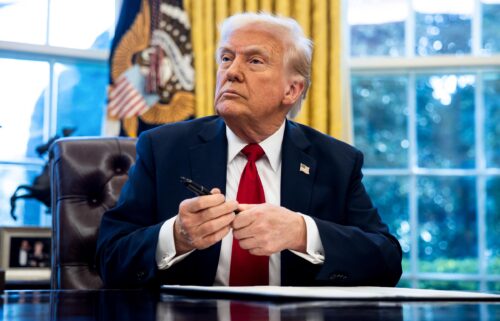Federal judge won’t block Medicare from negotiating drug prices
By Tami Luhby, CNN
(CNN) — A federal court judge in Ohio denied Friday an attempt by the US Chamber of Commerce to immediately stop the Biden administration’s implementation of Medicare’s new drug price negotiation program.
The ruling was the first time a federal court has weighed in on the multiple lawsuits filed against the controversial program.
The chamber filed a lawsuit in June arguing that allowing Medicare to negotiate drug prices is unconstitutional for several reasons. It then asked for a preliminary injunction to halt the program by October 1, when drug makers have to agree to participate in the program.
“As to Plaintiffs’ motion for a preliminary injunction, they have demonstrated neither a strong likelihood of success nor irreparable harm,” wrote Judge Michael Newman of the US District Court for the Southern District of Ohio, in Dayton.
“Any economic harm — which, on its own, is insufficient to satisfy this prong of a preliminary injunction analysis — will not occur for years in the future,” Newman wrote in his opinion.
In addition, Newman wrote that participation in Medicare is voluntary.
“Thus, the Program’s eventual ‘maximum fair price’ cannot be considered confiscatory because pharmaceutical manufacturers who do not wish to participate in the Program have the ability — practical or not — to opt out of Medicare entirely,” wrote Newman, a Trump appointee, of the drug price negotiation program. ” As there is no constitutional right (or requirement) to engage in business with the government, the consequences of that participation cannot be considered a constitutional violation.”
The judge, however, also denied the government’s motion to dismiss the case.
The chamber did not immediately return a request for comment. So far, it is the only plaintiff to request a preliminary injunction.
The Biden administration applauded the decision.
“Today’s ruling from the Southern District of Ohio affirms that Medicare will move forward with negotiating lower prices for millions of seniors,” White House press secretary Karine Jean-Pierre said in a statement. “And, the Biden-Harris Administration won’t stop fighting for what we know to be true: that nothing in the Constitution prohibits Medicare from negotiating drug prices.”
Medicare’s historic new power
The Inflation Reduction Act, which congressional Democrats passed last summer, fulfilled the party’s longstanding goal of allowing Medicare to negotiate the prices of certain expensive drugs bought at pharmacies and administered at doctors’ offices.
The Biden administration unveiled in late August the names of the first 10 drugs subject to price negotiations. They are: Eliquis, Jardiance, Xarelto, Januvia, Farxiga, Entresto, Enbrel, Imbruvica and Stelara, as well as Fiasp and certain other insulins made by Novo Nordisk, including NovoLog.
The medications treat heart disease, certain cancers, diabetes and autoimmune diseases, among other conditions.
The Centers for Medicare and Medicaid Services and drugmakers will spend the next year negotiating the drug prices, and the agency will publish the agreed-upon maximum fair prices by September 1, 2024. The negotiated prices take effect in 2026.
After this initial round, the Department of Health and Human Services secretary can negotiate another 15 drugs for 2027 and again for 2028. The number rises to 20 drugs a year for 2029 and beyond.
If drugmakers don’t comply with the process, they will have to pay an excise tax of up to 95% of the medications’ US sales or pull all their products from the Medicare and Medicaid markets. The pharmaceutical industry contends that the true penalty can be as high as 1,900% of sales.
Drug makers sue
Manufacturers and industry groups, however, hope to halt the negotiation process, filing multiple lawsuits in federal courts across the US. They each contend that the program is unconstitutional in various ways.
Among the arguments are that the program violates the Fifth Amendment’s “takings” clause because it allows Medicare to obtain manufacturers’ patented drugs, which are private property, without paying fair market value under the threat of serious penalties.
Plus, the negotiations process violates the First Amendment, the challengers say, because it coerces manufacturers into saying that they agree to the price that the government has dictated and that it’s fair.
Another argument is that the process violates the Eighth Amendment by levying an excessive fine if drugmakers refuse to negotiate and continue selling their products to the Medicare market.
The-CNN-Wire
™ & © 2023 Cable News Network, Inc., a Warner Bros. Discovery Company. All rights reserved.

